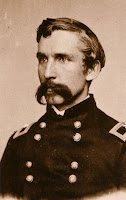
Joshua Lawrence Chamberlain is one of my heroes. Teaching at Bowdoin College in Brunswick, Maine, Chamberlain responded to President Abraham Lincoln’s call for troops to put down the rebellion. He enlisted in the 20th Maine regiment and was named lieutenant colonel. He devoted himself to study of the strategies and tactics of combat –a significant stretch for a man who was trained to be a Congregationalist minister.
Chamberlain’s skill and charisma led to his promotion as colonel of the regiment in 1863, and in July of that year his leadership was tested at Gettysburg, Pennsylvania. Sent to protect the left flank of the Union Army, his 20th Maine regiment was stationed on a hill now known as Little Round Top. They were ordered, “Hold this position at all costs.”
Within minutes the Mainers were attacked by Confederates, sometimes in hand-to-hand engagement. Nearly out of ammunition, Chamberlain decided to take the offensive, hoping that a bayonet attack would finally defeat the persistent enemy. He was desperate; a bayonet charge was all he had left.
I have to believe that as he made his decision Chamberlain recalled an occasion from his youth as he helped his father on the farm. The ox-drawn cart he was leading across a creek became stuck on the creek’s bank. When he called out to his father that the cart was stuck, his father yelled back, “Move it!” Young Joshua called out again, “How?” His father’s answer was terse, “Just do it!” In anger the boy pushed wildly on the wagon’s rear wheel, and that movement startled the oxen causing them to lurch forward, freeing the wheels and the wagon. Surely Colonel Chamberlain heard those same words as he stood on Little Round in another seemingly impossible predicament. “Just do it!” And he and his 20th Mainers did. They charged, their enemies retreated, the hill was secured, and Chamberlain earned the sobriquet “Hero of Little Round Top” by just doing it!
Later in life, after the war, Chamberlain reflected on his father's advice. He concluded that it was "a maxim whose value far exceeded the occasion." It was, he wrote, "an order for life" which he felt was worth a great deal more than years of book learning --action, not words!

No comments:
Post a Comment